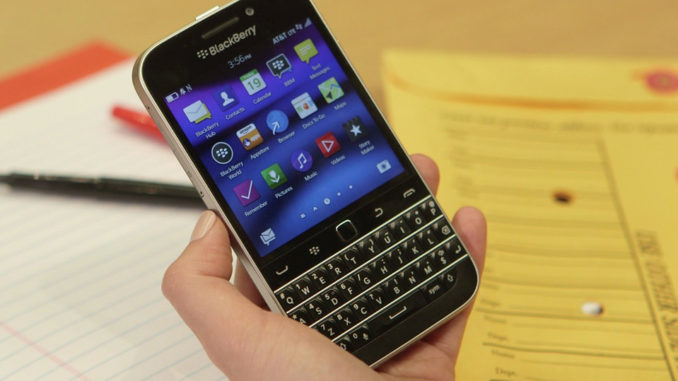
WATERLOO, Ontario— BlackBerry Ltd. said Wednesday it would stop making its once-dominant devices to focus on software, pulling out of the bruising global smartphone race that it kicked off almost two decades ago.
The strategy shift, more than a year in the making, will end all of BlackBerry’s internal hardware development and outsource it instead to various partners, the Waterloo, Ontario-based company said.
The move was largely anticipated after Chief Executive John Chen signaled he would decide this month on the fate of the iconic BlackBerry phones, which were introduced after the company launched a pioneering two-way data messenger in 1998, and went on to claim a dominant share in the world’s market for smartphones.
Even though BlackBerry’s share of the global smartphone market is now below 1%, after years of losing ground to nimbler competitors such as Apple Inc. and Samsung Electronics Co Ltd., the decision to stop making a product that was once so far ahead of its competition shows how badly the company stumbled after its initial success.
Now, by jettisoning handset development, Mr. Chen will face increasing pressure to demonstrate the viability of his plan to grow the struggling company’s software and services business, which grew at a slower-than-expected pace in the second quarter.

Investors were cheered by the shift, and BlackBerry shares were recently up nearly 5% at $8.27 on Nasdaq on Wednesday.
Mr. Chen told reporters outsourcing “is the best way to drive profitability in the device business.” He later declared that the company’s “turnaround is done” and said his focus would now turn to growth.
Software sales, he said, will continue to be driven by mobile-management tools aimed at businesses and government, such as BES12, which allows companies to manage devices from various providers that are used by employees on corporate networks.
Software and services revenue in BlackBerry’s latest quarter, released alongside news of its strategy shift, more than doubled from a year earlier, to $156 million. Still, that was down from $166 million the previous quarter. The company said it continues to expect revenue growth of 30% from software and services this fiscal year.
Nearly a decade ago, BlackBerry rose to become Canada’s largest company by market capitalization, with a value of $83 billion. That has since sharply eroded to just $4.1 billion as of Wednesday, according to FactSet data. From its peak of more than 17,000 employees at the end of fiscal 2011, it had fewer than 5,000 at the end of its latest fiscal year.
Analysts have been expecting BlackBerry to give up on its hardware business for some time as device sales continued to weigh on revenue. The company sold 400,000 devices in its fiscal second quarter, down from 500,000 in its first quarter and 600,000 the quarter before that.
“BlackBerry is just facing the brutal commercial truth that the device business is not a place you need to be, especially when you have options that aren’t red hot,” said Ben Wood, chief of research at wireless consultancy CCS Insight.
BlackBerry has received expressions of interest from potential buyers seeking to buy the company at a steep discount, according to people familiar with these talks. The overtures have been rejected, these people say, because the company’s major shareholders, Fairfax Financial Holdings Ltd. and Primecap Management Co. support Mr. Chen’s vision of growing the company through software development.
At a luncheon earlier in the week, Mr. Chen said he had no plans to sell any of the company’s assets and would prefer instead to license BlackBerry’s technology and patents to others.
Mr. Chen is credited with cutting costs and shifting the company’s strategic focus after he joined the company in 2013 to higher-margin mobile software products. He had already scaled back the company’s device lineup and had outsourced some manufacturing.
BlackBerry will receive a fixed royalty for each new handset sold by an Indonesian joint venture and is in talks with other third parties to develop additional devices, Mr. Chen said.
BlackBerry ended its fiscal second quarter with overall revenue of $334 million, down 32% from a year earlier and below the $394 million analysts polled by Thomson Reuters expected.
The company posted a net loss of $372 million, which included a $96 million inventory charge. Adjusted to exclude items, however, it broke even on a per-share basis for the second quarter in a row, beating analyst expectations for a loss of 5 cents a share.
BlackBerry revised its earnings outlook for the current fiscal year to between a loss of 5 cents a share and break-even, better than the consensus for a loss of 15 cents.
BlackBerry also announced on Wednesday the departure of Chief Financial Officer James Yersh for personal reasons. He will be succeeded at the end of October by Steven Capelli, who worked with Mr. Chen in previous roles, including at Sybase.
Source: The World Street Journal
